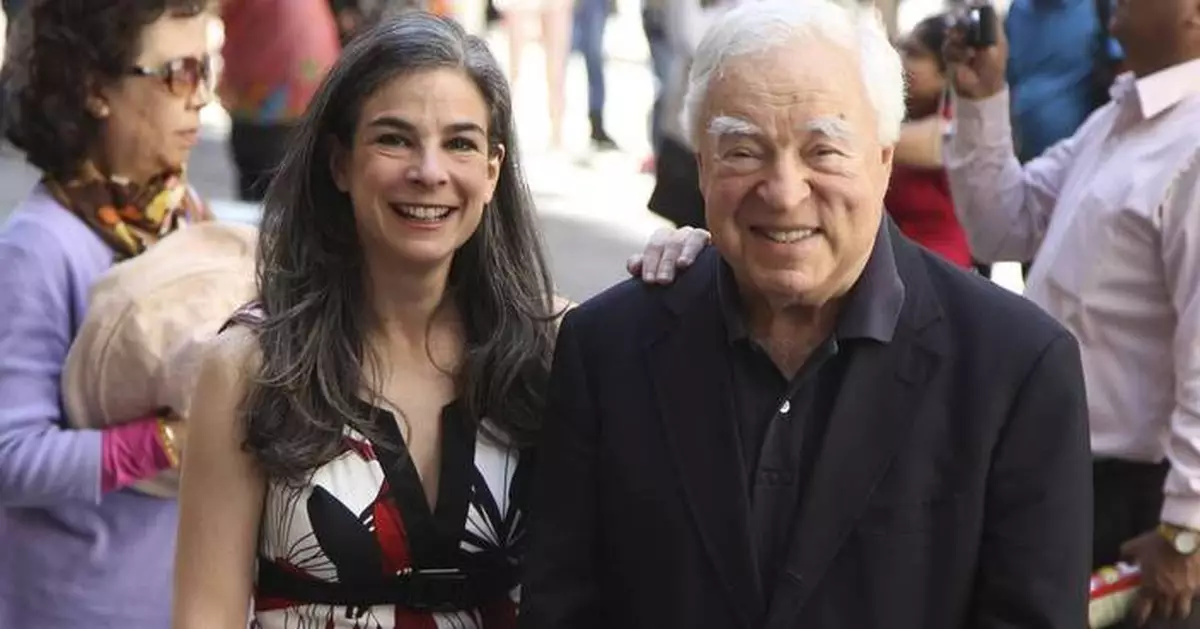NEW YORK (AP) — Arthur Frommer, whose "Europe on 5 Dollars a Day" guidebooks revolutionized leisure travel by convincing average Americans to take budget vacations abroad, has died. He was 95.
Frommer died from complications of pneumonia, his daughter Pauline Frommer said Monday.
“My father opened up the world to so many people," she said. "He believed deeply that travel could be an enlightening activity and one that did not require a big budget.”
Frommer began writing about travel while serving in the U.S. Army in Europe in the 1950s. When a guidebook he wrote for American soldiers overseas sold out, he launched what became one of the travel industry’s best-known brands, self-publishing "Europe on 5 Dollars a Day" in 1957.
"It struck a chord and became an immediate best-seller," he recalled in an interview with The Associated Press in 2007, on the 50th anniversary of the book's debut.
The Frommer’s brand, led today by his daughter Pauline, remains one of the best-known names in the travel industry, with guidebooks to destinations around the world, an influential social media presence, podcasts and a radio show.
Frommer's philosophy — stay in inns and budget hotels instead of five-star hotels, sightsee on your own using public transportation, eat with locals in small cafes instead of fancy restaurants — changed the way Americans traveled in the mid- to late 20th century. He said budget travel was preferable to luxury travel "because it leads to a more authentic experience.” That message encouraged average people, not just the wealthy, to vacation abroad.
It didn’t hurt that his books hit the market as the rise of jet travel made getting to Europe easier than crossing the Atlantic by ship. The books became so popular that there was a time when you couldn’t visit a place like the Eiffel Tower without spotting Frommer’s guidebooks in the hands of every other American tourist.
Frommer’s advice also became so standard that it's hard to remember how radical it seemed in the days before discount flights and backpacks. "It was really pioneering stuff,” Tony Wheeler, founder of the Lonely Planet guidebook company, said in an interview in 2013. Before Frommer, Wheeler said, you could find guidebooks “that would tell you everything about the church or the temple ruin. But the idea that you wanted to eat somewhere and find a hotel or get from A to B -- well, I’ve got a huge amount of respect for Arthur.”
"Arthur did for travel what Consumer Reports did for everything else," said Pat Carrier, former owner of The Globe Corner, a travel bookstore in Cambridge, Massachusetts.
The final editions of Frommer's groundbreaking series were titled "Europe from $95 a Day." The concept no longer made sense when hotels could not be had for less than $100 a night, so the series was discontinued in 2007. But the Frommer publishing empire did not disappear, despite a series of sales that started when Frommer sold the guidebook company to Simon & Schuster. It was later acquired by Wiley Publishing, which in turn sold it to Google in 2012. Google quietly shut the guidebooks down, but Arthur Frommer — in a David vs. Goliath triumph — got his brand back from Google. In November 2013 with his daughter Pauline, he relaunched the print series with dozens of new guidebook titles.
“I never dreamed at my age I’d be working this hard,” he told the AP at the time, age 84.
Frommer also remained a well-known figure in 21st century travel, opinionated to the end of his career, speaking out on his blog and radio show. He hated mega-cruise ships and railed against travel websites where consumers put up their own reviews, saying they were too easily manipulated with phony postings. And he coined the phrase “Trump Slump” in a widely quoted column that predicted a slump in tourism to the U.S. after Donald Trump was elected president.
Frommer was born in Lynchburg, Virginia, and grew up during the Great Depression in Jefferson City, Missouri, the child of a Polish father and Austrian mother. "My father had one job after another, one company after another that went bankrupt," he recalled. The family moved to New York when he was a teenager. He worked as an office boy at Newsweek, went to New York University and was drafted upon graduating from Yale Law School in 1953. Because he spoke French and Russian, he was sent to work in Army intelligence at a U.S. base in Germany, where the Cold War was heating up.
His first glimpse of Europe was from the window of a military transport plane. Whenever he had a weekend leave or a three-day pass, he'd hop a train to Paris or hitch a ride to England on an Air Force flight. Eventually he wrote "The GI's Guide to Traveling in Europe," and a few weeks before his Army stint was up, he had 5,000 copies printed by a typesetter in a German village. They were priced at 50 cents apiece, distributed by the Army newspaper, Stars & Stripes.
Shortly after he returned to New York to practice law at the firm Paul, Weiss, Rifkind, Wharton & Garrison, he received a cable from Europe. "The book was sold out, would I arrange a reprint?" he said.
Soon after he spent his month's vacation from the law firm doing a civilian version of the guide. "In 30 days I went to 15 different cities, getting up at 4 a.m., running up and down the streets, trying to find good cheap hotels and restaurants," he recalled.
The resulting book, the very first “Europe on 5 Dollars a Day,” was much more than a list. It was written with a wide-eyed wonder that verged on poetry: "Venice is a fantastic dream," Frommer wrote. "Try to arrive at night when the wonders of the city can steal upon you piecemeal and slow. ... Out of the dark, there appear little clusters of candy-striped mooring poles; a gondola approaches with a lighted lantern hung from its prow."
Eventually Frommer gave up law to write the guides full-time. Daughter Pauline joined him with his first wife, Hope Arthur, on their trips starting in 1965, when she was 4 months old. "They used to joke that the book should be called 'Europe on Five Diapers a Day,'" Pauline Frommer said.
In the 1960s, when inflation forced Frommer to change the title of the book to "Europe on 5 and 10 Dollars a Day," he said "it was as if someone had plunged a knife into my head."
Asked to summarize the impact of his books in a 2017 Associated Press interview, he said that in the 1950s, “most Americans had been taught that foreign travel was a once-in-a-lifetime experience, especially travel to Europe. They were taught that they were going to a war-torn country where it was risky to stay in any hotel other than a five-star hotel. It was risky to go into anything but a top-notch restaurant. … And I knew that all these warnings were a lot of nonsense.”
He added: “We were pioneers in also suggesting that a different type of American should travel, that you didn’t have to be well-heeled.”
To the end of his life, he said he avoided traveling first class. “I fly economy class and I try to experience the same form of travel, the same experience that the average American and the average citizen of the world encounters,” he said.
As Frommer aged, his daughter Pauline gradually became the force behind the company, promoting the brand, managing the business and even writing some of the content based on her own travels. Her relationship with her father was both tender and respectful, and she summed it up this way in a 2012 email to AP: “It’s wonderful to have a working partner whose mind is a steel trap, and who doesn't just have smarts, but wisdom. His opinions, whether or not you agree with them, come from his social values. He's a man who puts ethics at the center of his life, and weaves them into everything he does.”
In addition to Pauline, Frommer’s survivors include his second wife, Roberta Brodfeld, and four grandchildren.
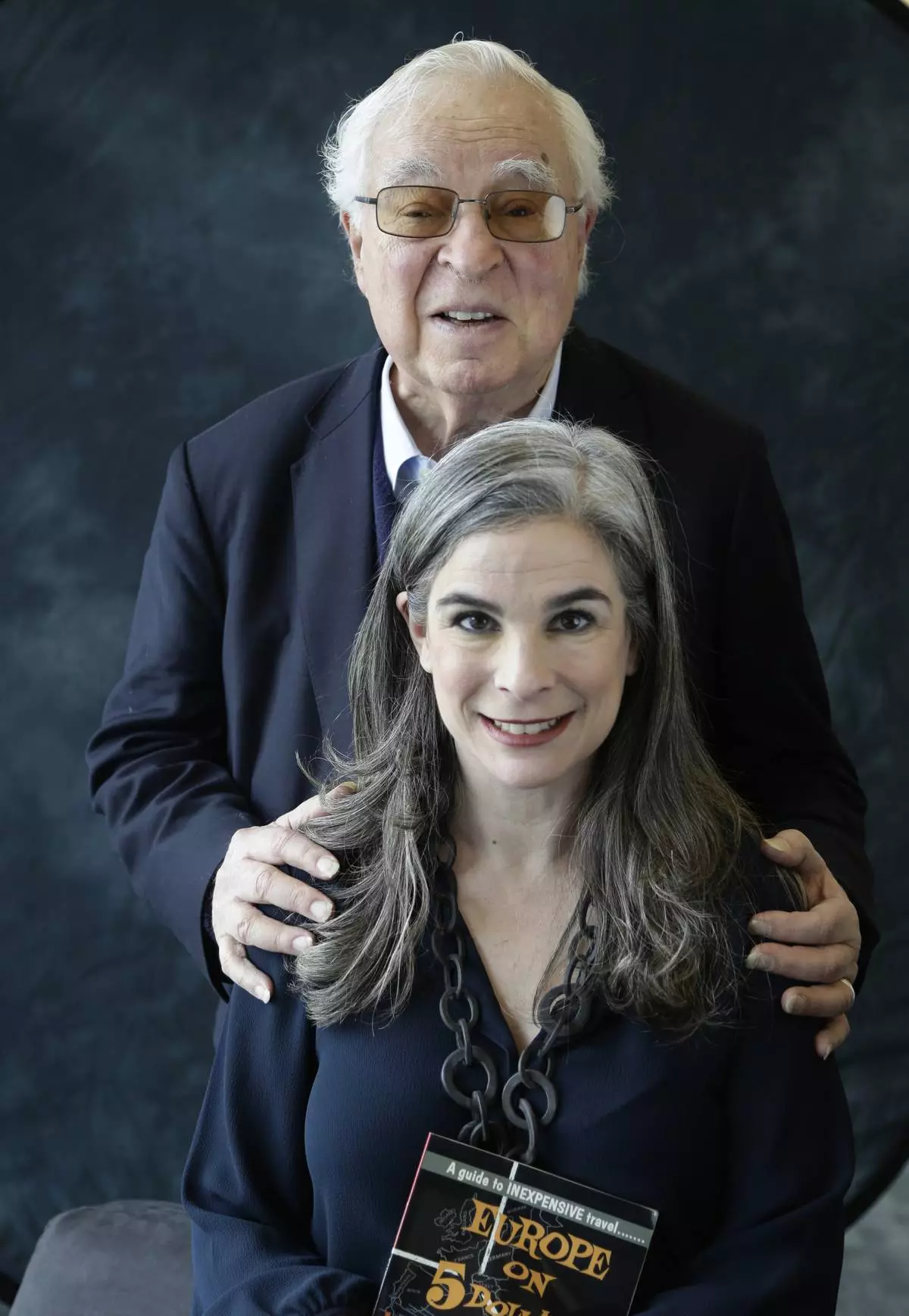
FILE - Arthur Former, background, poses with his daughter, Pauline, in New York, Jan. 6, 2017. (AP Photo/Peter Morgan, File)

FILE - Arthur Frommer, 83, and his daughter, Pauline Frommer, 46, prepare for their radio show at the WOR studios in New York, May 20, 2012. (AP Photo/Seth Wenig, File)
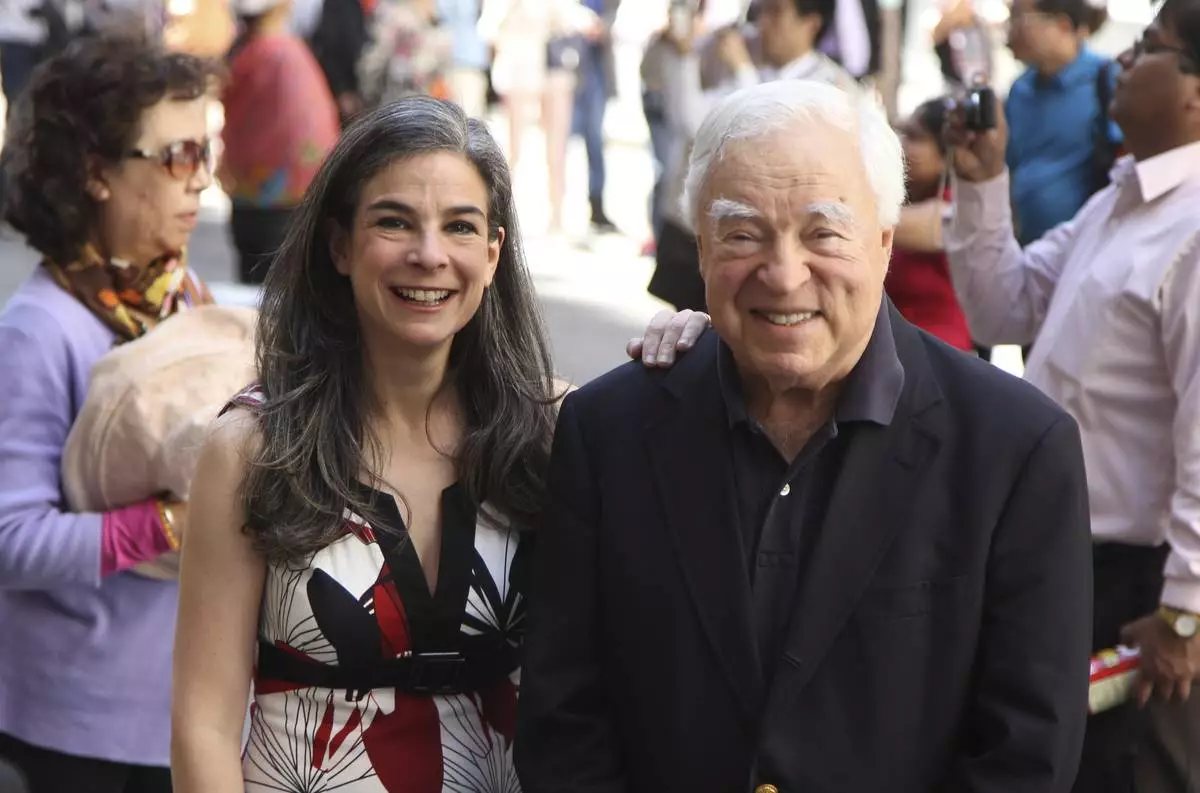
FILE - Arthur Frommer, 83, and his daughter, Pauline Frommer, 46, pose among tourists in the Wall Street area in New York, May 20, 2012. (AP Photo/Seth Wenig, File)
HONG KONG (AP) — Dozens of prominent activists were sentenced to up to 10 years in prison on Tuesday in Hong Kong’s biggest national security case under a sweeping law imposed by Beijing that crushed a once-thriving pro-democracy movement.
The defendants were prosecuted in 2021 for their roles in an unofficial primary election under the 2020 national security law. They were accused of attempting to paralyze Hong Kong’s government and force the city’s leader to resign by aiming to win a legislative majority and using it to block government budgets indiscriminately.
The 45 convicted received prison terms ranging from four years and two months to 10 years. Legal scholar Benny Tai was given the longest sentence.
They either pleaded guilty to or were found guilty of conspiracy to commit subversion by three government-approved judges. The judges said in the verdict that the activists’ plans to effect change through the election would have undermined the government’s authority and created a constitutional crisis. Two of the 47 original defendants were acquitted.
Tai, who had written an article outlining "ten steps to mutual destruction" is widely seen as the organizer behind the unofficial primary. In a judgment uploaded online, the judges wrote that Tai essentially “advocated for a revolution” by publishing a series of articles over a period of months that traced his thinking, even though in his mitigation letter Tai said the steps were “never intended to be used as blueprint for any political action.”
Some defendants had claimed that the scheme to secure a majority of seats in the legislature would never have materialized, though the judges rejected this reasoning, stating that “all the participants had put in every endeavor to make it a success."
In the judgment, the judges highlighted that a great deal of time, resources and money had been put into the organization of the primary election, and rejected the idea that the scheme had been “doomed to fail.”
“When the Primary Election took place on the 10 and 11 July, no one had remotely mentioned the fact that Primary Election was no more than an academic exercise and that the Scheme was absolutely unattainable,” the judgment read. “In order to succeed, the organisers and participants might have hurdles to overcome, that however was expected in every subversion case where efforts were made to overthrow or paralyse a government.”
The judges said the sentences had been reduced for defendants who said they were unaware the plan to secure a majority in the legislature and stall governance was unlawful.
However, the penalties were not reduced for Tai and Alvin Yeung, as they are lawyers who were “absolutely adamant in pushing for the implementation of the Scheme.”
Observers said the case illustrated how authorities suppressed dissent following huge anti-government protests in 2019, alongside media crackdowns and reduced public choice in elections. The drastic changes reflect how Beijing’s promise to retain the former British colony’s civil liberties for 50 years when it returned to China in 1997 is increasingly threadbare, they said.
Beijing and Hong Kong governments insist the law is necessary for the city's stability.
The sentencing drew criticism from foreign governments and human rights organizations globally.
The U.S. Consulate in Hong Kong said the U.S. strongly condemned the sentences against the 45 pro-democracy advocates and former lawmakers.
“The defendants were aggressively prosecuted and jailed for peacefully participating in normal political activity protected under Hong Kong’s Basic Law,” the statement said. “We call on (Beijing) and Hong Kong authorities to cease politically motivated prosecutions of Hong Kong citizens and to immediately release all political prisoners and individuals jailed for their peaceful advocacy for rights and freedoms.”
Australia's Foreign Minister Penny Wong said its government “gravely concerned” by the sentences for Australian citizen Gordon Ng and the other activists.
“Australia has expressed our strong objections to the Chinese and Hong Kong authorities on the continuing broad application of national security legislation, including in application to Australian citizens,” Wong said in a statement. “We call for China to cease suppression of freedoms of expression, assembly, media and civil society, consistent with the Human Rights Committee and Special Procedure recommendations, including the repeal of the National Security Law in Hong Kong.”
Human Rights Watch said “running in an election and trying to win it is now a crime that can lead to a decade in prison in Hong Kong.”
“Today’s harsh sentences against dozens of prominent democracy activists reflect just how fast Hong Kong’s civil liberties and judicial independence have nosedived in the past four years since the Chinese government imposed the draconian National Security Law on the city,” Maya Wang, associate China director at the rights group, said in a statement.
The subversion case involves pro-democracy activists across the spectrum. They include Tai, former student leader Joshua Wong and former lawmakers. Most of them have already been detained for more than three and a half years before the sentencing. The separations pained them and their families.
More than 200 people stood in line in moderate rain and winds Tuesday morning for a seat in the court, including one of the acquitted defendants Lee Yue-shun. Lee said he hoped members of the public would show they care about the development of the court case.
“The public's interpretation and understanding has a far-reaching impact on our society's future development,” he said.
A supporter locally known as “Grandpa Wong,” who did not know the English spelling of his name, said he wanted to see the convicted activists again. He is about 100 years old and feared he wouldn't be able to see them when they are released from prison.
Wei Siu-lik, a friend of convicted activist Clarisse Yeung, said she arrived at 4 a.m. even though her leg was injured. “I wanted to let them know there are still many here coming here for them,” she said.
Thirty-one activists entered a guilty plea and have better chances of getting reduced sentences. The law authorizes a range of sentences depending on the seriousness of the offense and the defendant’s role in it, going from under three years for the least serious to 10 years to life for people convicted of “grave” offenses.
The unofficial primary in July 2020, which drew 610,000 voters, was meant to pick pro-democracy candidates who would then run in the official election.
The pro-democracy camp at that time hoped they could secure a legislative majority, which would allow them to press for the 2019 protest demands, including greater police accountability and democratic elections for the city leader.
But the government postponed the legislative election that would have followed the primary, citing public health risks during the COVID-19 pandemic.
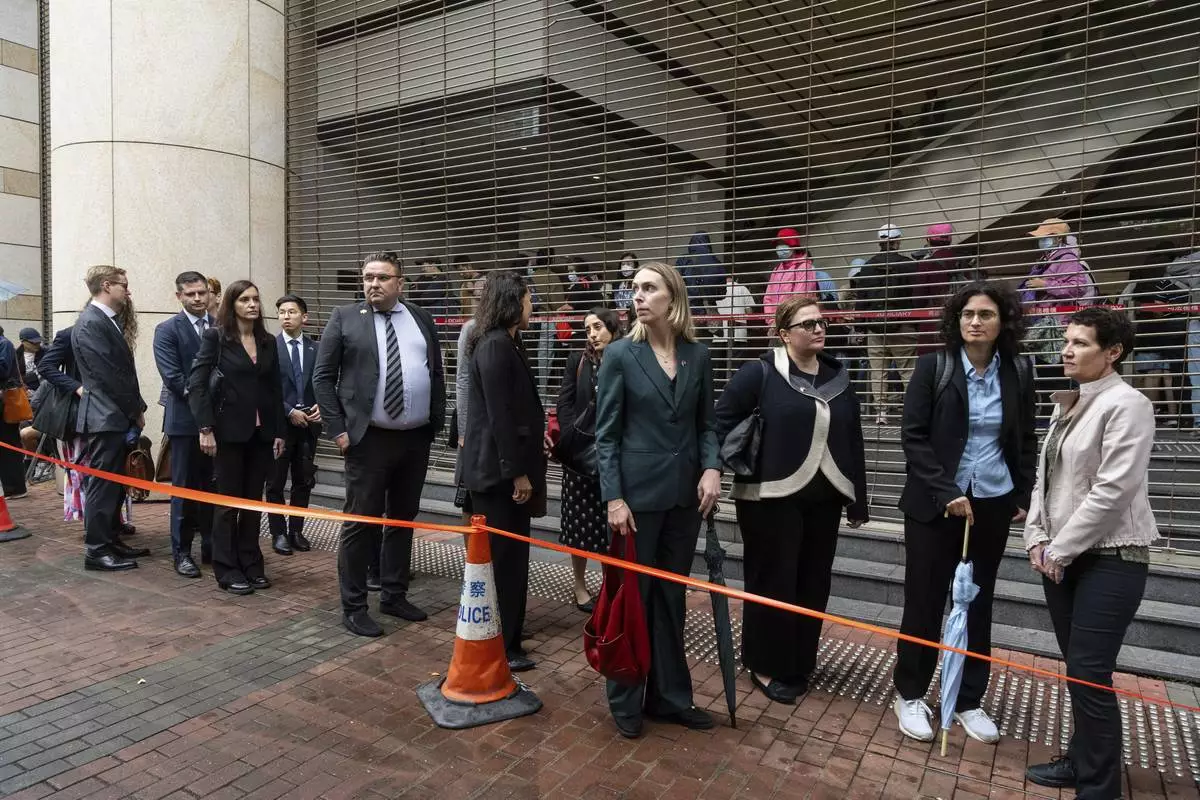
Representatives from various consulates wait in line outside the West Kowloon Magistrates' Courts in Hong Kong Tuesday, Nov. 19, 2024, ahead of the sentencing in national security case. (AP Photo/Chan Long Hei)
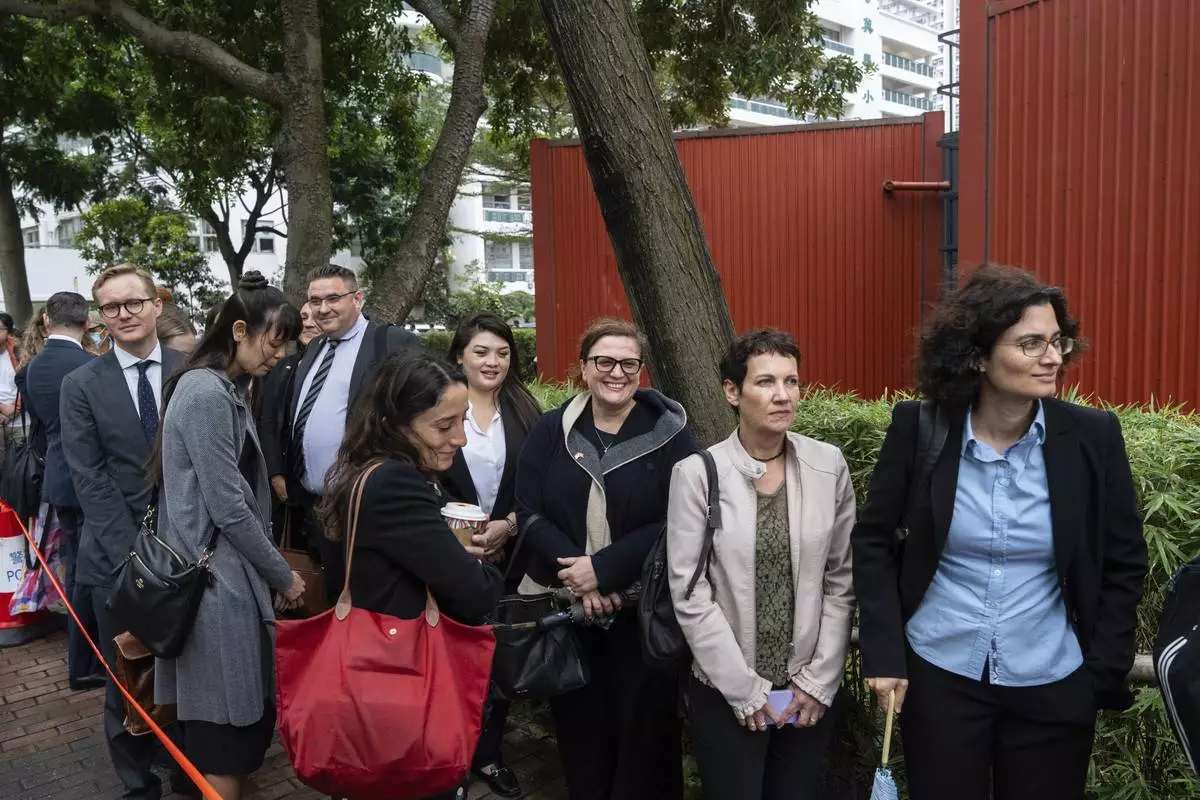
Representatives from various consulates wait in line outside the West Kowloon Magistrates' Courts in Hong Kong Tuesday, Nov. 19, 2024, ahead of the sentencing in national security case. (AP Photo/Chan Long Hei)
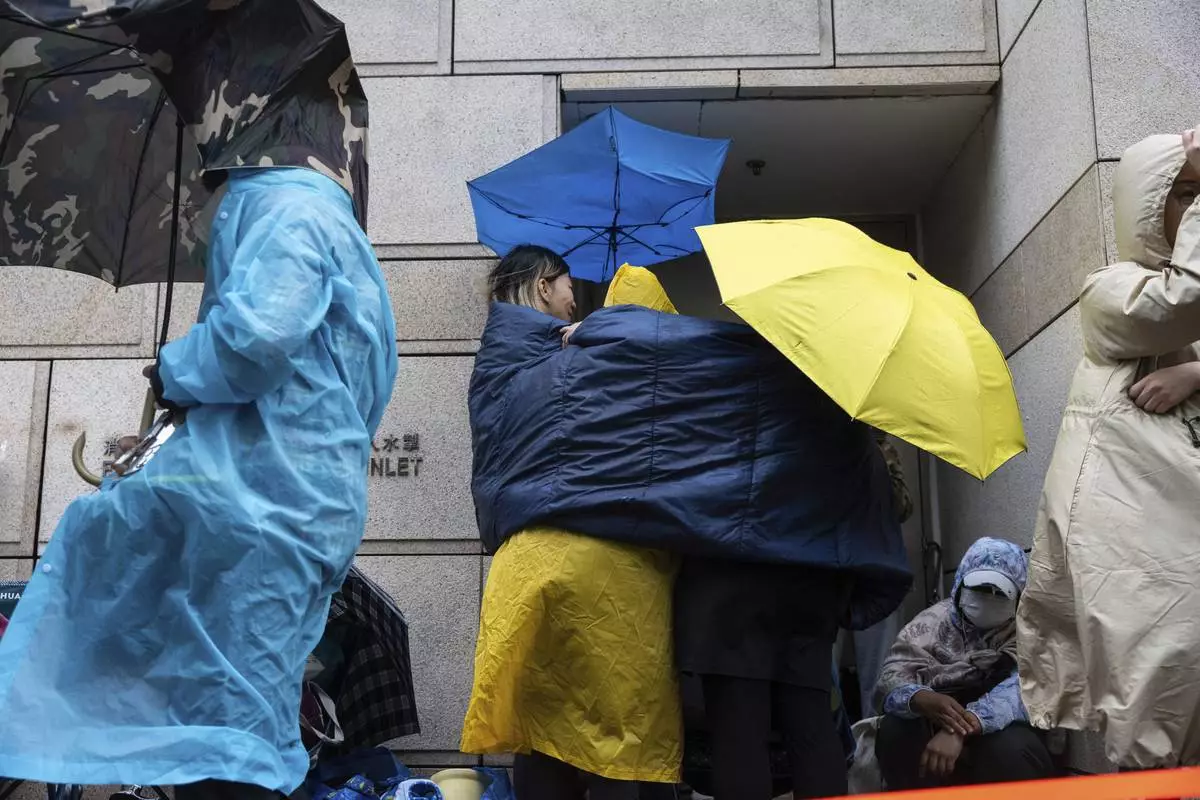
People wait outside the West Kowloon Magistrates' Courts in Hong Kong Tuesday, Nov. 19, 2024, ahead of the sentencing in national security case. (AP Photo/Chan Long Hei)
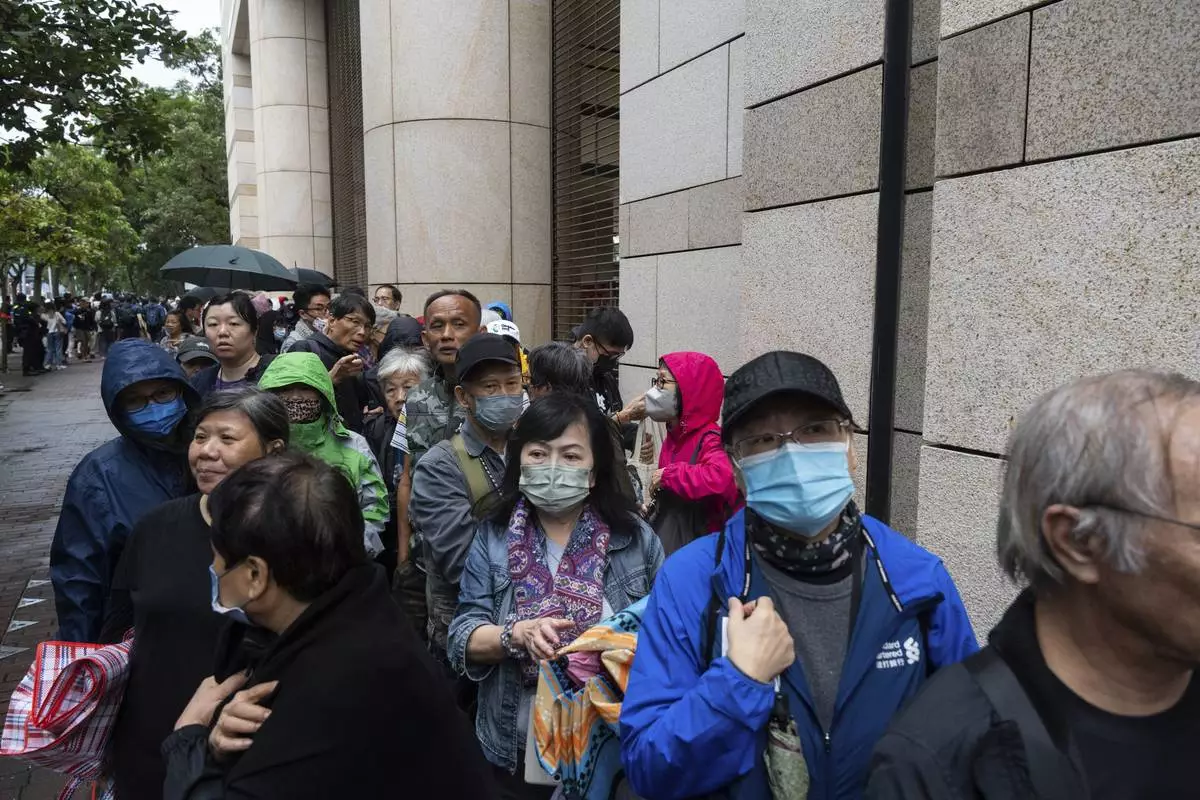
People wait outside the West Kowloon Magistrates' Courts in Hong Kong Tuesday, Nov. 19, 2024, ahead of the sentencing in national security case. (AP Photo/Chan Long Hei)
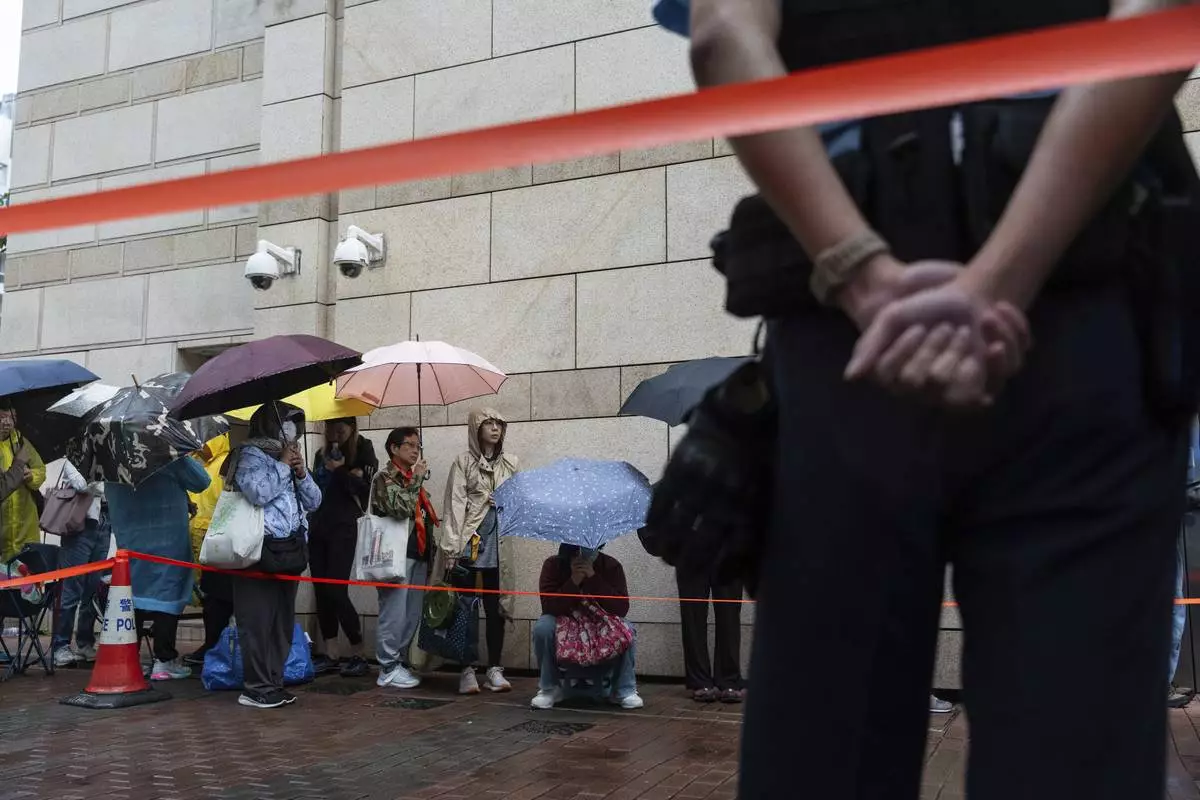
People wait outside the West Kowloon Magistrates' Courts in Hong Kong Tuesday, Nov. 19, 2024, ahead of the sentencing in national security case. (AP Photo/Chan Long Hei)
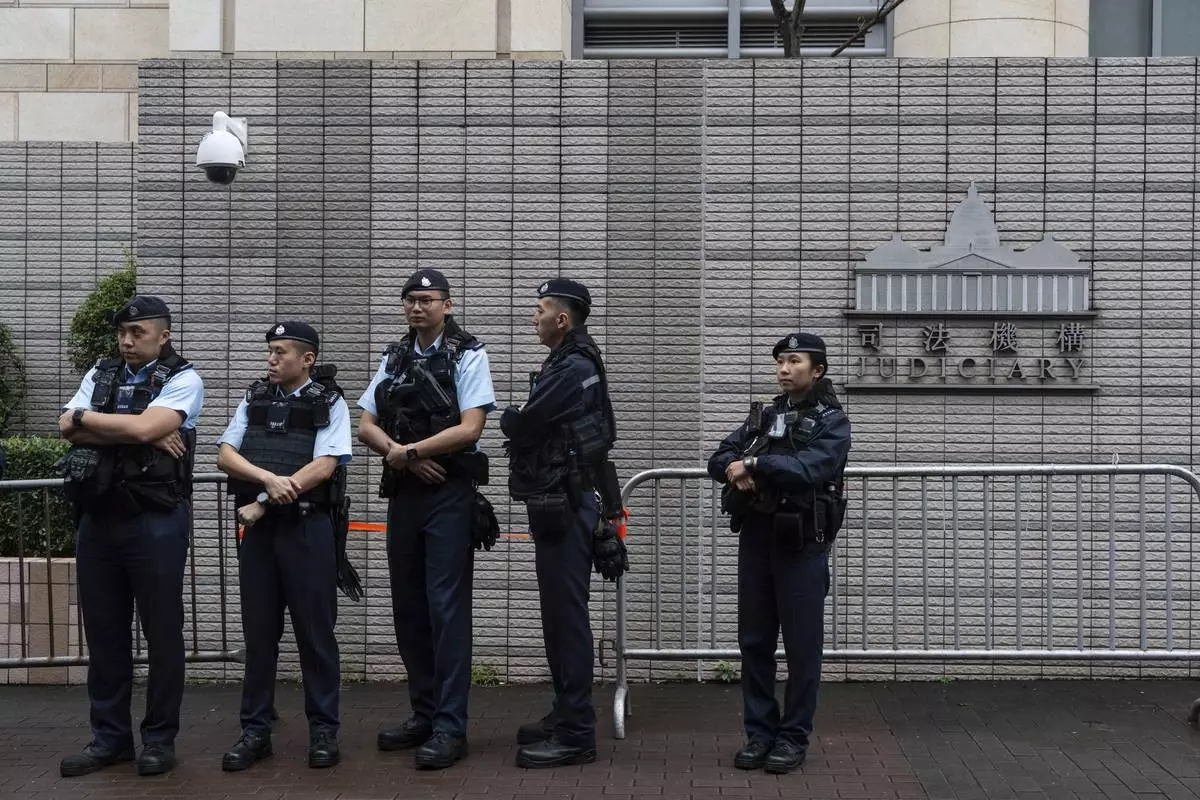
Police officers stand guard outside the West Kowloon Magistrates' Courts in Hong Kong Tuesday, Nov. 19, 2024. (AP Photo/Chan Long Hei)
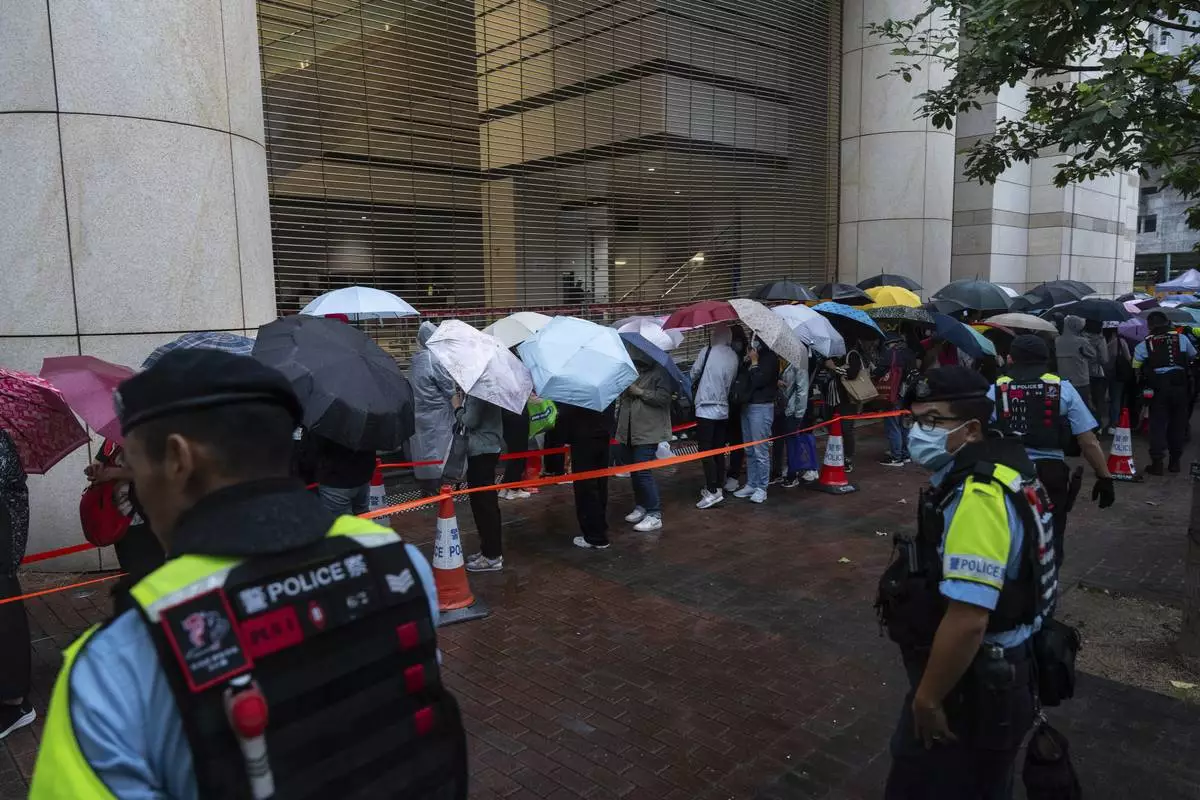
People wait outside the West Kowloon Magistrates' Courts in Hong Kong Tuesday, Nov. 19, 2024, ahead of the sentencing in national security case. (AP Photo/Chan Long Hei)
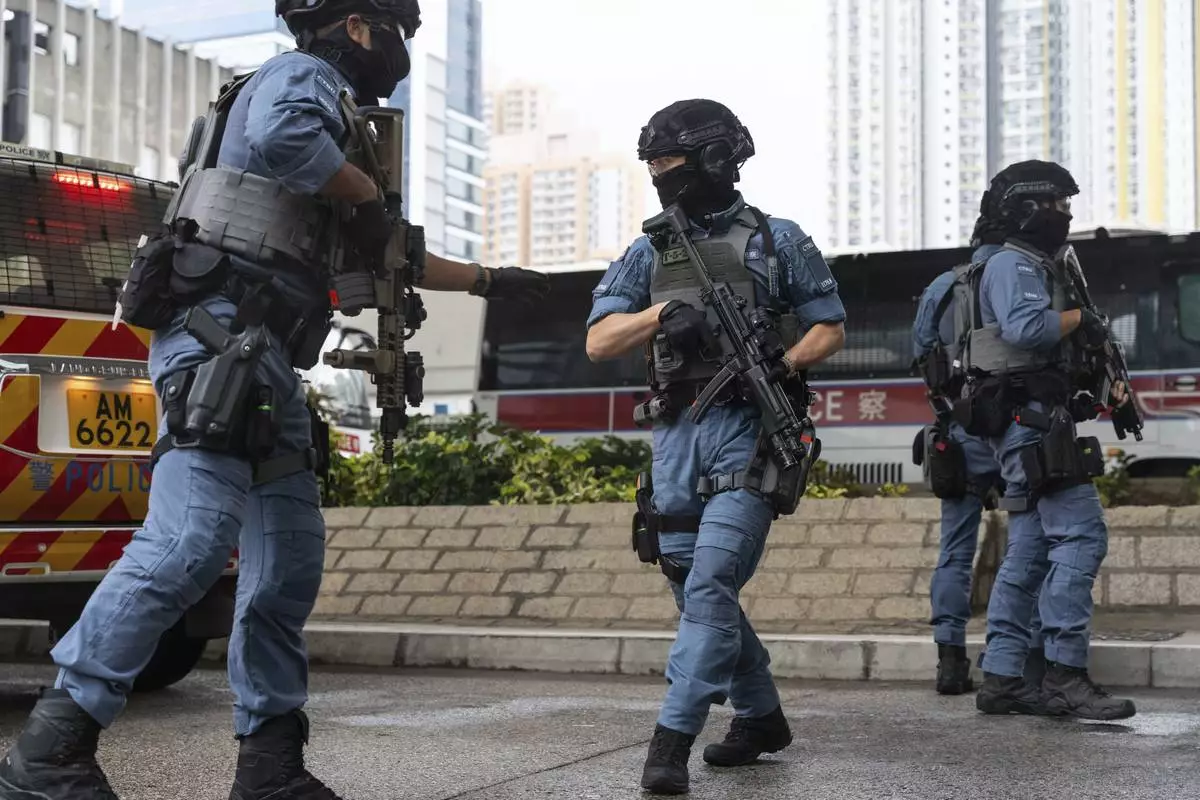
Armed police officers stand guard outside the West Kowloon Magistrates' Courts in Hong Kong Tuesday, Nov. 19, 2024. (AP Photo/Chan Long Hei)
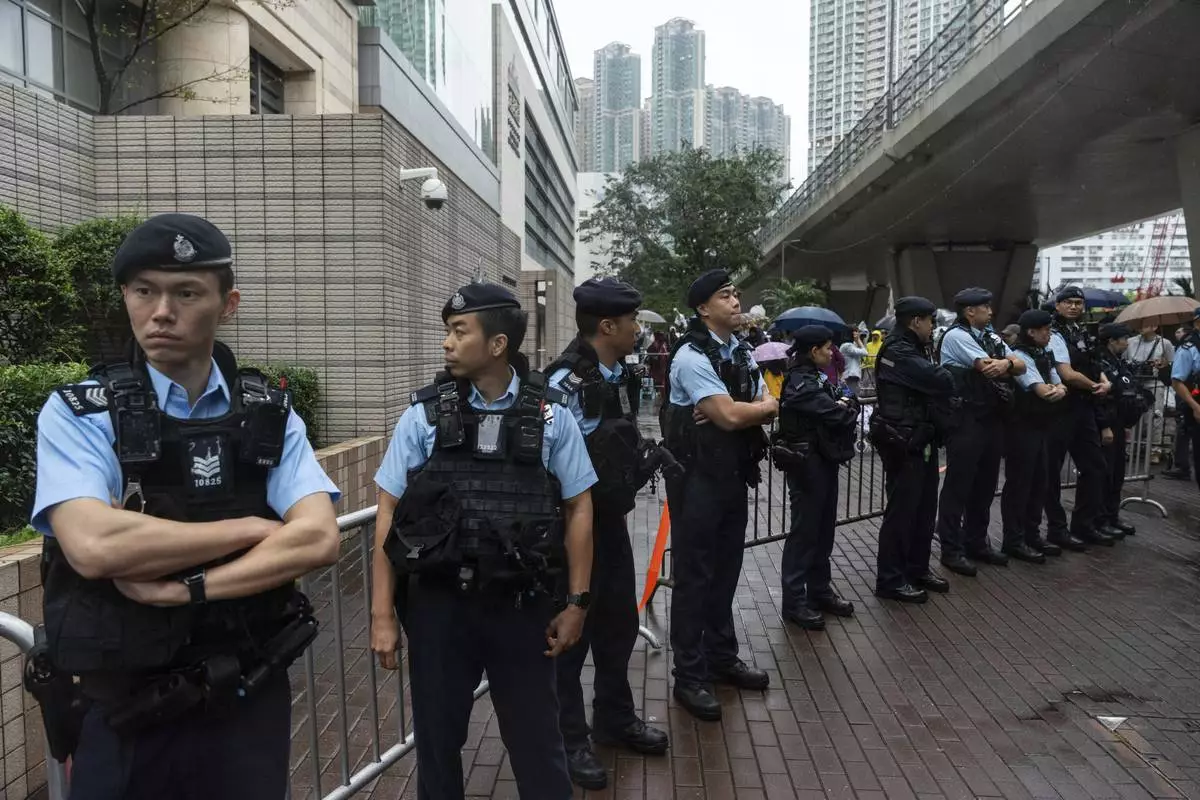
Police officers stand guard outside the West Kowloon Magistrates' Courts in Hong Kong, Tuesday, Nov. 19, 2024. (AP Photo/Chan Long Hei)

FILE - Former lawmaker Leung Kwok-hung, known as "Long Hair," second left, shows a victory sign as some of the 47 pro-democracy activists are escorted by Correctional Services officers to a prison van in Hong Kong, March 4, 2021. (AP Photo/Kin Cheung, File)
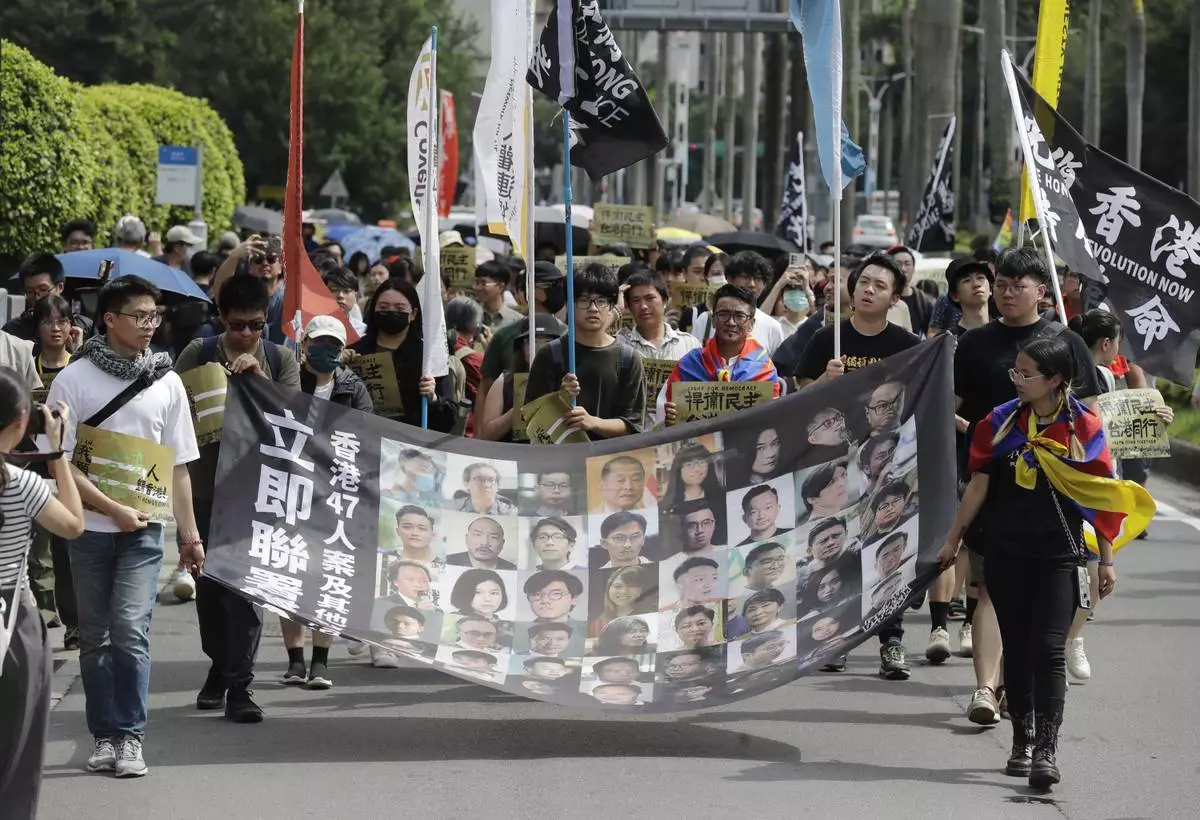
FILE- Hong Kong activists and supporters march with a banner which reads " Unite now in solidarity with the Hong Kong 47 and other political prisoners" during a protest commemorating the 10th anniversary of the 2014 umbrella movement and the fifth anniversary of the anti-extradition law amendment bill movement in Taipei, Taiwan, June 9, 2024. (AP Photo/Chiang Ying-ying, File)
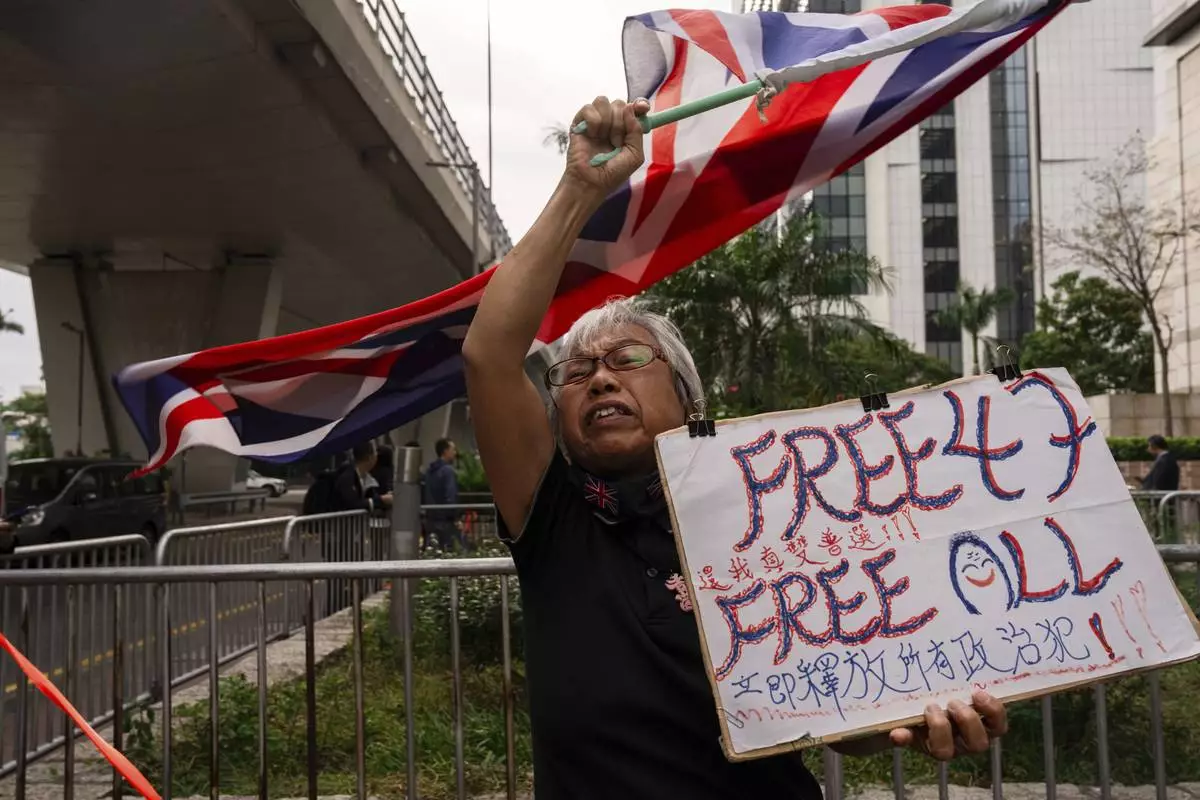
FILE- A pro-democracy activist known as "Grandma Wong" protests outside the West Kowloon courts in a cordoned off area set up by police as closing arguments open in Hong Kong's largest national security trial of 47 pro-democracy figures in Hong Kong, Nov. 29, 2023. (AP Photo/Louise Delmotte, File)
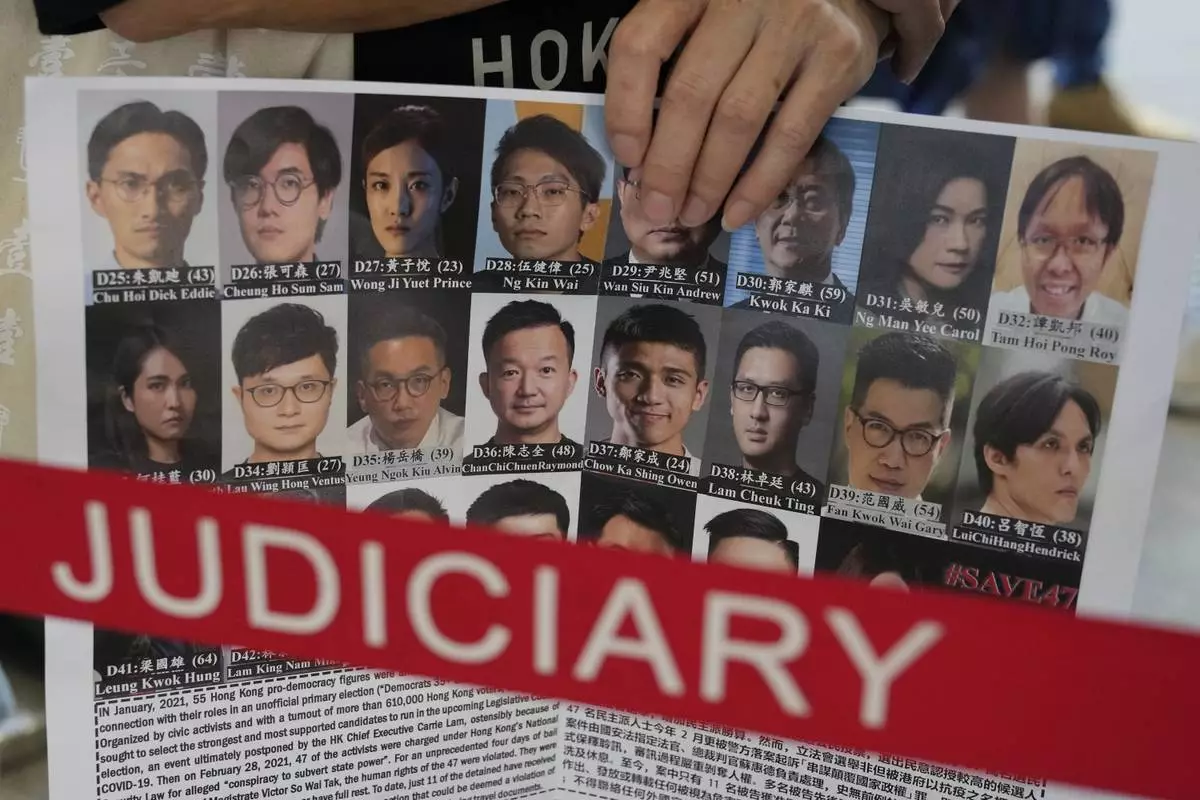
FILE - A supporter holds a placard with the photos of some of the 47 pro-democracy defendants outside a court in Hong Kong, on July 8, 2021. (AP Photo/Kin Cheung, File)
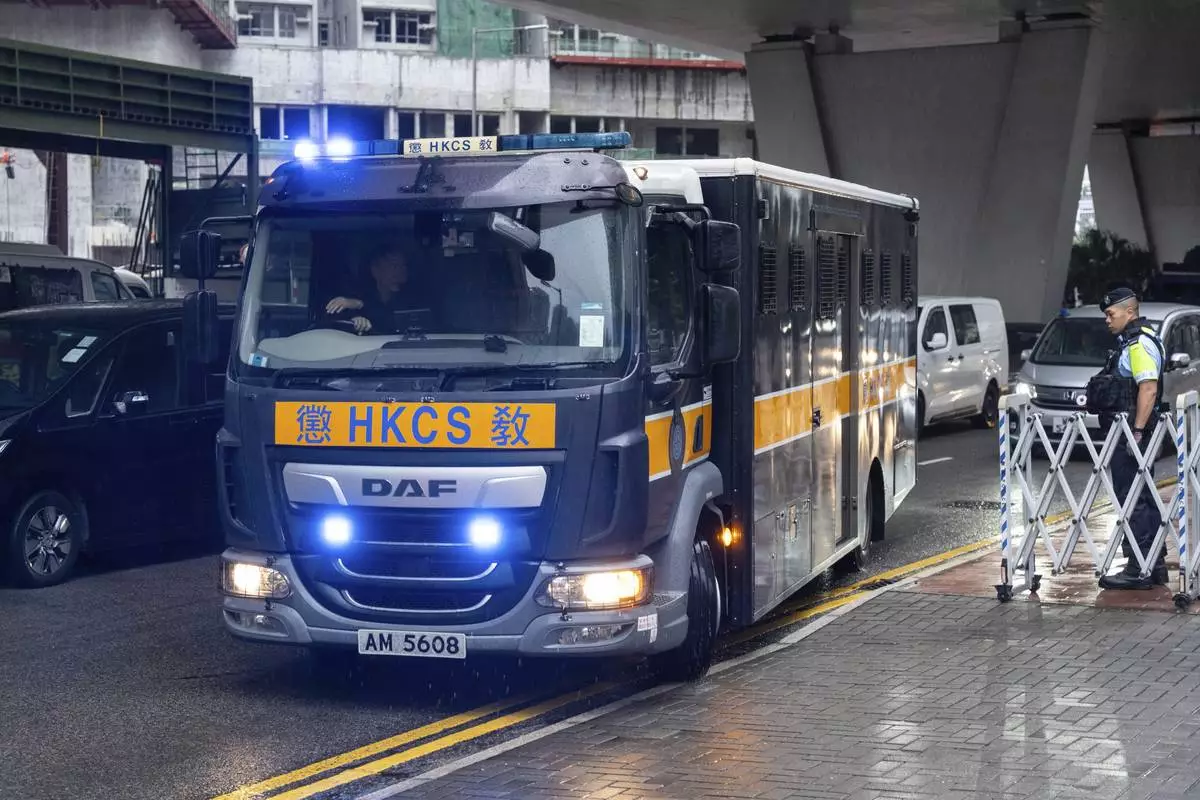
A Correctional Services Department vehicle arrives at the West Kowloon Magistrates' Courts in Hong Kong Tuesday, Nov. 19, 2024, ahead of the sentencing in national security case. (AP Photo/Chan Long Hei)

A Correctional Services Department vehicle arrives at the West Kowloon Magistrates' Courts in Hong Kong Tuesday, Nov. 19, 2024, ahead of the sentencing in national security case. (AP Photo/Chan Long Hei)
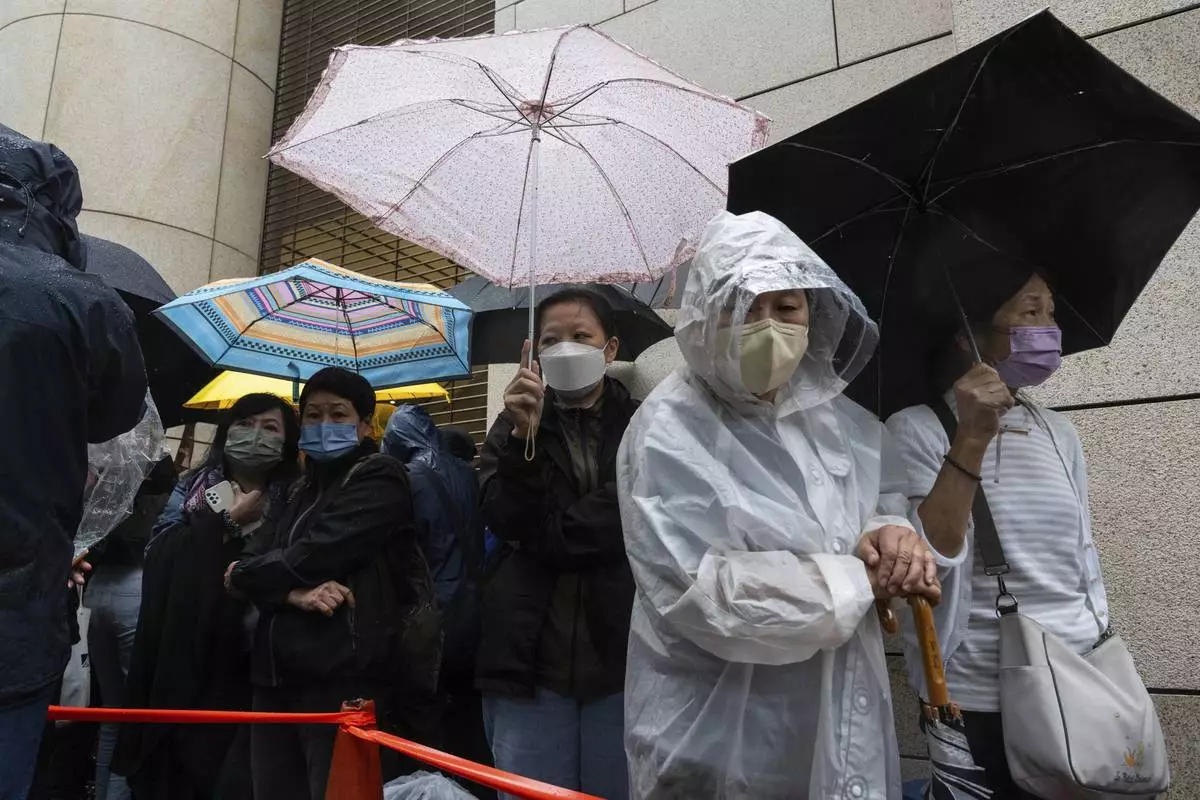
People wait outside the West Kowloon Magistrates' Courts in Hong Kong Tuesday, Nov. 19, 2024, ahead of the sentencing in national security case. (AP Photo/Chan Long Hei)
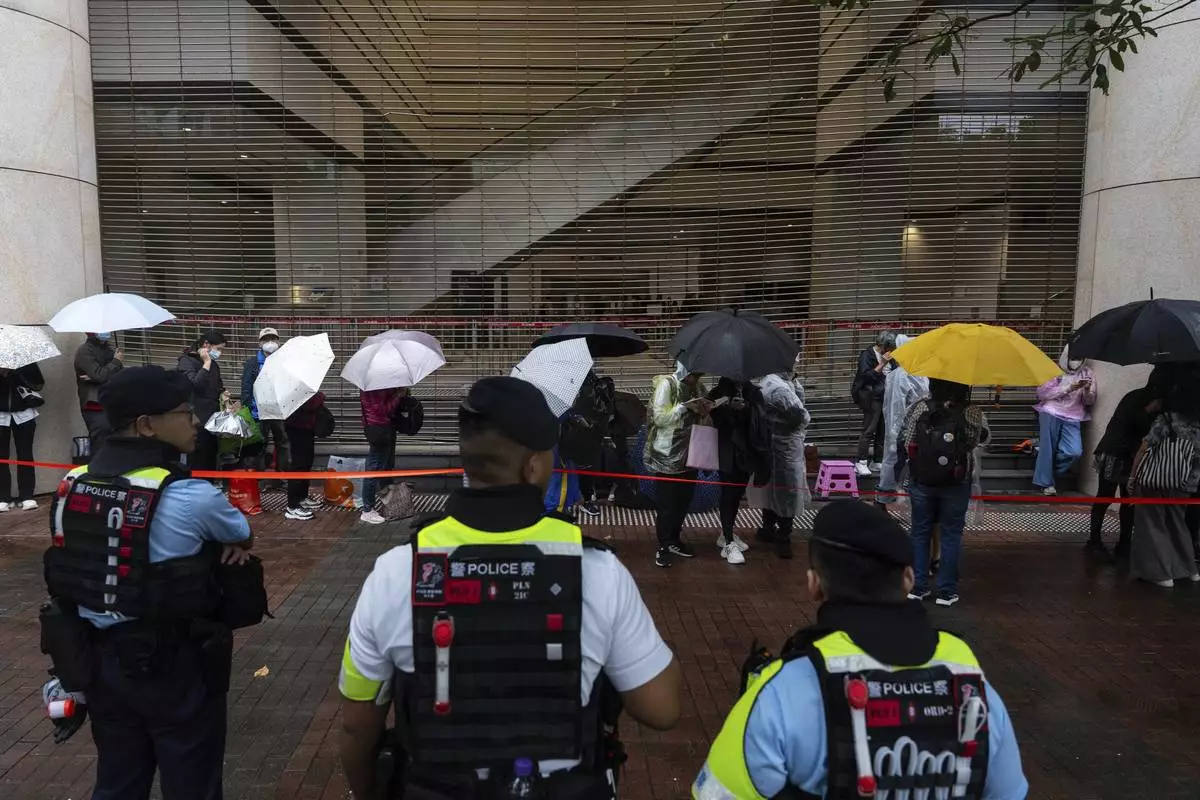
People wait outside the West Kowloon Magistrates' Courts in Hong Kong Tuesday, Nov. 19, 2024, ahead of the sentencing in national security case. (AP Photo/Chan Long Hei)





